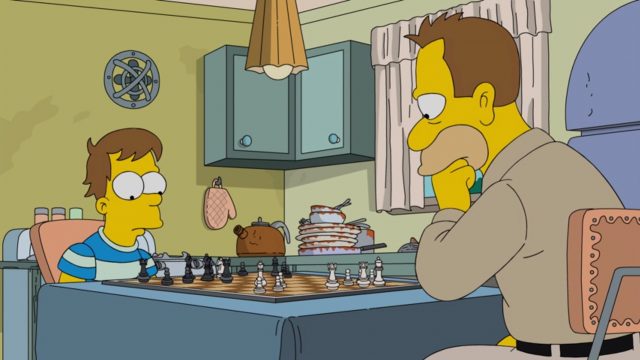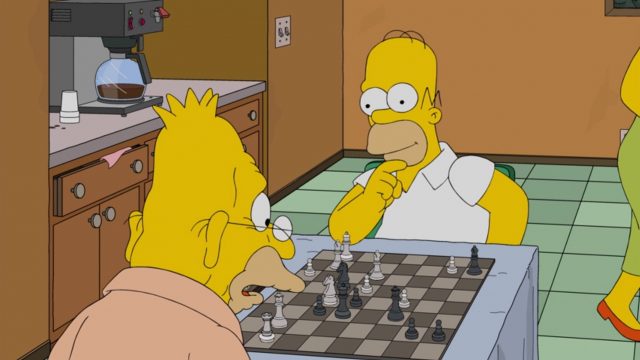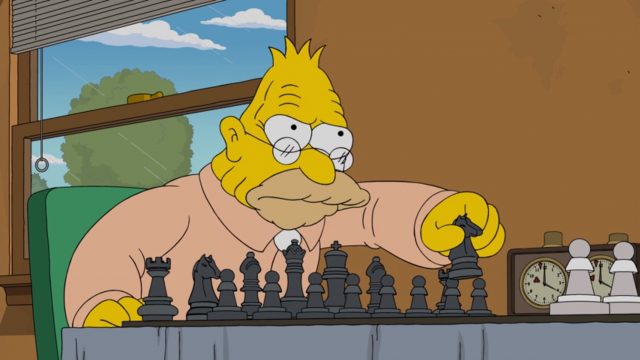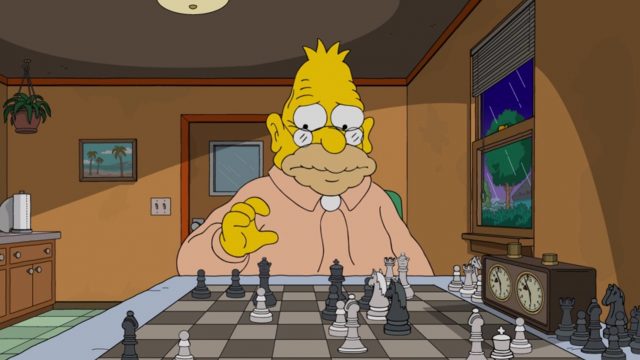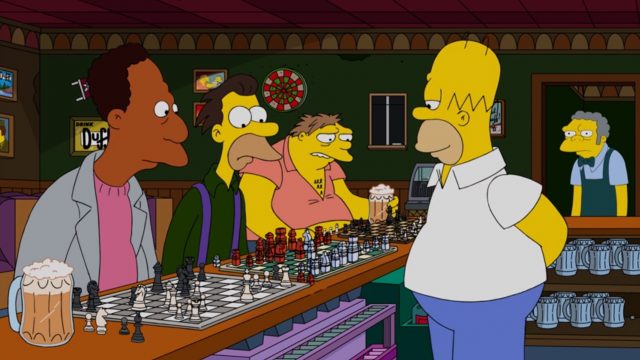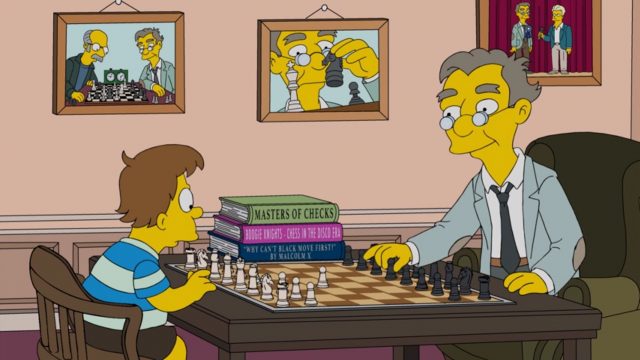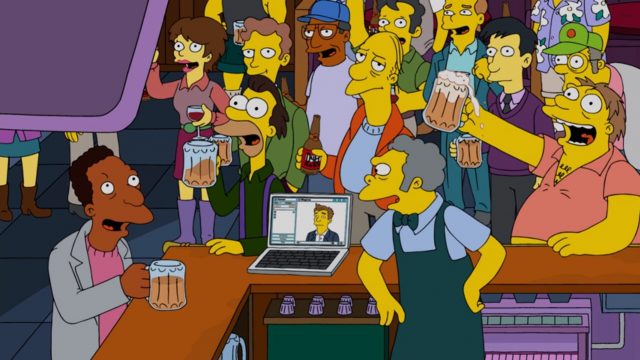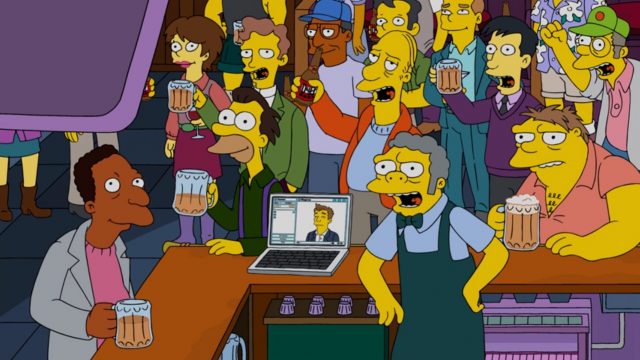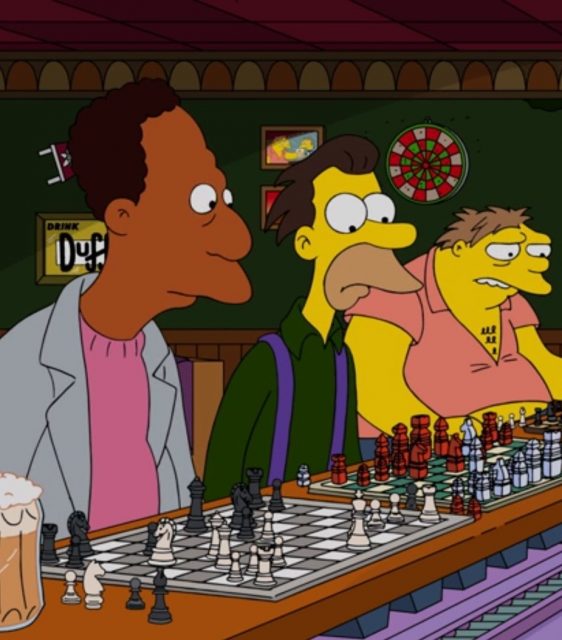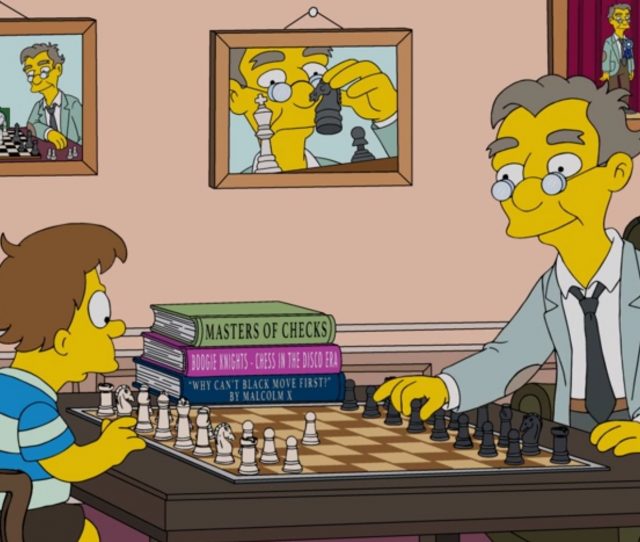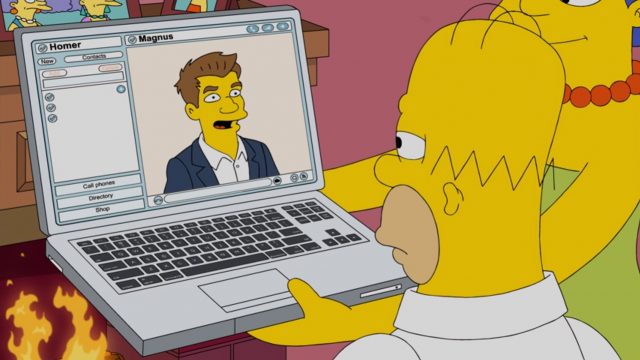 For months, the chess world has awaited Magnus Carlsen's cameo on The Simpsons.
Magnus Carlsen is pop culture's favorite chessplayer, bringing chess into many unlikely spaces, even modeling campaigns and a Porsche commercial.
The Simpsons is a staple of American culture and the longest-running American sitcom, currently on its 28th season. The show has featured cameos from names as notable as Paul McCartney, Stephen Hawking, Dolly Parton, Conan O' Brien, Venus and Serena Williams, Betty White, Elton John---the list goes on and on.
Magnus Carlsen's cameo is a big step for the game into mainstream culture. In fact, the show featured chess as a focal point throughout the entire episode.
On the other hand, pop culture has a habit of misrepresenting chess, often featuring everything from incorrectly set-up boards to huge misunderstandings of the game and the culture.
How did The Simpsons portray chess when writing a Magnus Carlsen storyline? Let's take a look.
Before you read further, if you haven't watched the episode, I'd recommend it. It's available on the FOX website, titled "The Cad and the Hat".
For months, the chess world has awaited Magnus Carlsen's cameo on The Simpsons.
Magnus Carlsen is pop culture's favorite chessplayer, bringing chess into many unlikely spaces, even modeling campaigns and a Porsche commercial.
The Simpsons is a staple of American culture and the longest-running American sitcom, currently on its 28th season. The show has featured cameos from names as notable as Paul McCartney, Stephen Hawking, Dolly Parton, Conan O' Brien, Venus and Serena Williams, Betty White, Elton John---the list goes on and on.
Magnus Carlsen's cameo is a big step for the game into mainstream culture. In fact, the show featured chess as a focal point throughout the entire episode.
On the other hand, pop culture has a habit of misrepresenting chess, often featuring everything from incorrectly set-up boards to huge misunderstandings of the game and the culture.
How did The Simpsons portray chess when writing a Magnus Carlsen storyline? Let's take a look.
Before you read further, if you haven't watched the episode, I'd recommend it. It's available on the FOX website, titled "The Cad and the Hat".
Pros
1. It describes chess as a sport.
Many in the chess world consider it important that chess is recognized as a legitimate competitive sport along with athletic pastimes. The Simpsons episode supports this viewpoint.- Chess is first introduced in the episode by Marge saying, "Maybe you should watch this sport instead" as she pulls Homer into a beachside chess park.
- Like many sports movies, the episode uses the game to explore the often complicated dynamics of father-son relationships. Homer's chess abilities are connected to his childhood experiences with his father. By the end of the episode, he resolves his issues with his father through the game.
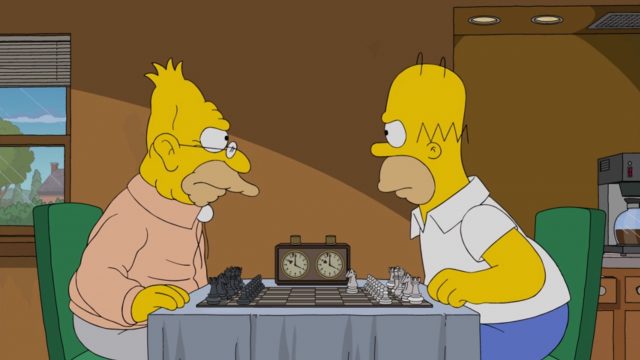 "To find your true feelings, you must finish your final chess match with your father." -Magnus Carlsen's advice to Homer
"To find your true feelings, you must finish your final chess match with your father." -Magnus Carlsen's advice to Homer- Watching a chess game is compared to watching the Super Bowl. While the people at Moe's bar watch Homer's chess match with his father, someone enters and asks, "Doesn't anyone want to watch the Super Bowl?" To which, Moe replies, "Get lost!"
2. It includes recognizable chess culture references.
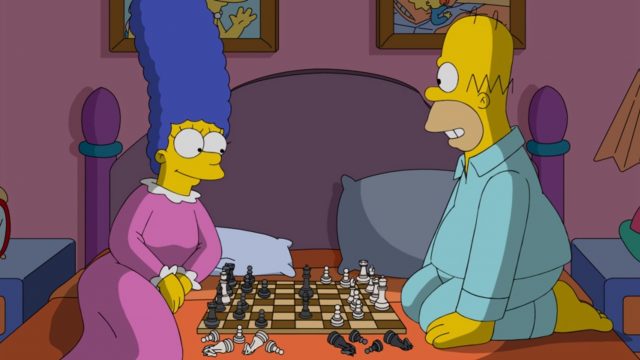
- In Homer's game against Marge, he wins with a famous checkmate-in-three pattern inspired by the game Richard Reti vs. Savielly Tartakower in 1910.
Homer Simpson vs. Marge Simpson
White to move and mate in 3.
[pgn] [Site "?"] [Round "?"] [White "Homer Simpson"] [Black "Marge Simpson"] [Result "*"] [SetUp "1"] [FEN "r1b1k2r/1pp2ppp/p3p3/8/1b2q2Q/P6P/1PPB2P1/2KR1B1R w kq - 0 0"] [PlyCount "5"]1. Qd8+ Kxd8 2. Bg5+ Ke8 3. Rd8# *[/pgn]
[pgn] [Site "Vienna 1910"] [Round "?"] [White "Reti, Richard"] [Black "Tartakower, Savielly"] [Result "1-0"] [ECO "B15"] [PlyCount "21"] [EventDate "1910.??.??"] [EventType "tourn"] [EventRounds "45"] [EventCountry "AUT"] [Source "ChessBase"] [SourceDate "1998.11.10"]1. e4 c6 2. d4 d5 3. Nc3 dxe4 4. Nxe4 Nf6 5. Qd3 e5 6. dxe5 Qa5+ 7. Bd2 Qxe5 8. O-O-O Nxe4 $2 9. Qd8+ $1 Kxd8 10. Bg5+ Kc7 (10... Ke8 11. Rd8#) 11. Bd8# 1-0[/pgn]Later in the episode, another Tartakower game is referenced and, again, he is on the losing side.
- Homer's final game against his father is a re-creation of the game: Botvinnik vs. Tartakower, Nottingham 1936.
[pgn][Site "Nottingham 1936"] [White "Botvinnik, Mikhail"] [Black "Tartakower, Savielly"] [Result "1-0"] [ECO "A55"] [PlyCount "59"] [EventDate "1936.08.10"] [EventType "tourn"] [EventRounds "15"] [EventCountry "ENG"] [Source "ChessBase"] [SourceDate "1999.07.01"]1. Nf3 Nf6 2. c4 d6 3. d4 Nbd7 4. g3 e5 5. Bg2 Be7 6. O-O O-O 7. Nc3 c6 8. e4 Qc7 9. h3 Re8 10. Be3 Nf8 11. Rc1 h6 12. d5 Bd7 13. Nd2 g5 14. f4 gxf4 15. gxf4 Kg7 16. fxe5 dxe5 17. c5 cxd5 18. Nxd5 Qc6 19. Nc4 Ng6 20. Nd6 Be6 21. Nxe7 Nxe7 22. Rxf6 Kxf6 23. Qh5 Ng6 24. Nf5 Rg8 25. Qxh6 Bxa2 26. Rd1 Rad8 27. Qg5+ Ke6 28. Rxd8 f6 29. Rxg8 Nf4 30. Qg7 1-0[/pgn]Nottingham 1936 was one of the strongest tournaments of its time with all of the top eight players in the world competing, including five world champions Botvinnik, Capablanca, Alekhine, Lasker, and Euwe. The game, Botvinnik vs. Tartakower, won the brilliancy prize of the tournament. The clash between Homer and his father is a meaningful parallel to the clash between Botvinnik and Tartakower. Nottingham 1936 was one of Botvinnik's first great tournament victories (he tied for 1st along with Capablanca) while Tartakower was one of the classic masters of the hypermodern school of chess. Watching the expression of Homer's father throughout the game and how it changes when he realizes he's losing brings to mind a famous Tartakower quote:
"A Chess game is divided into three stages: the first, when you hope you have the advantage, the second when you believe you have an advantage, and the third... when you know you're going to lose!"
- One of the bar patrons playing against Homer in the simul tells him, "You're playing like Polugaevsky at Mar del Plata!"
3. It shows the spectator side of the game.
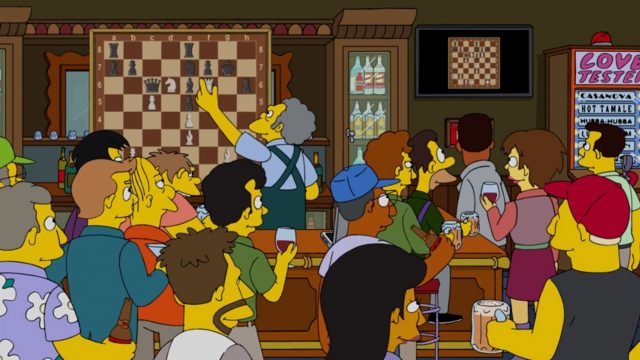 While I've seen numerous mainstream movies and TV shows feature a chess game, I don't think I've seen any others that feature the spectator's perspective. While Homer plays his final match against his father, a crowd of spectators gather at Moe's Tavern and watch the game the way that most major tournaments are watched all over the world---on a screen. In addition, the scene blends classic and modern commentary styles---Moe shows the game, move by move, on a large demo board while Magnus Carlsen plays the role of on-screen commentator, evaluating each position for the crowd through a Skype connection.
While I've seen numerous mainstream movies and TV shows feature a chess game, I don't think I've seen any others that feature the spectator's perspective. While Homer plays his final match against his father, a crowd of spectators gather at Moe's Tavern and watch the game the way that most major tournaments are watched all over the world---on a screen. In addition, the scene blends classic and modern commentary styles---Moe shows the game, move by move, on a large demo board while Magnus Carlsen plays the role of on-screen commentator, evaluating each position for the crowd through a Skype connection.
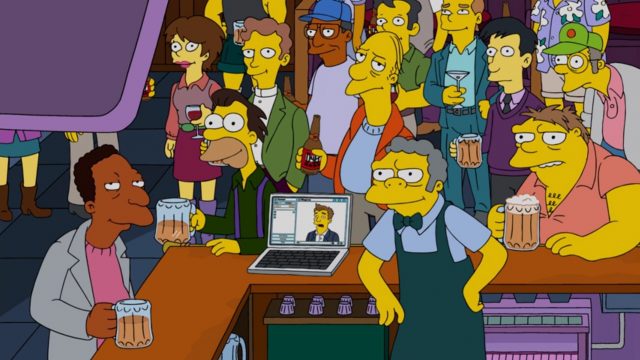 In his article, "Magnus Mentors Homer Simpson", Mike Klein even compares Moe's Tavern to the Kingside Diner, an eatery next door to the St. Louis Chess Club where chess spectators often gather to watch some of the top events in the country:
In his article, "Magnus Mentors Homer Simpson", Mike Klein even compares Moe's Tavern to the Kingside Diner, an eatery next door to the St. Louis Chess Club where chess spectators often gather to watch some of the top events in the country:
"Like the Kingside Diner in St. Louis, a crowd watches the game unfold to its dramatic conclusion... Carlsen commentates via Skype on the Simpson family battle, with Moe's Tavern being the replacement for the Kingside Diner."
4. It portrays serious study as essential to mastery.
While there’s some debate in the chess community about how much talent factors into chess ability, there is no question that any amount of talent must be combined with study and hard work to achieve top results. Non-chess players, however, often have the misconception that chess ability is simply a reflection of natural brilliance. Homer's story in The Simpsons counters this common misconception. When Homer begins playing chess as a boy, he shows very little ability, losing to his father in the shortest game possible, the two move checkmate.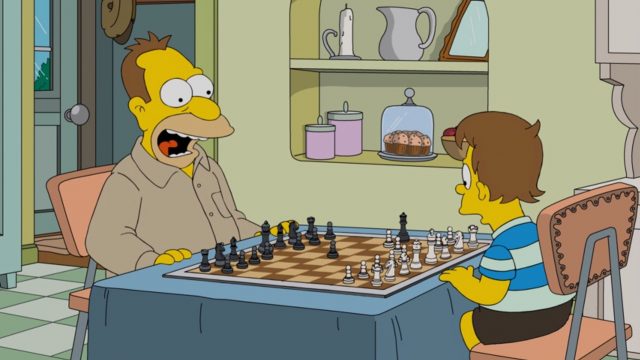 Then, Homer seeks out a chess teacher to help him improve, and he begins taking lessons from a master of the game every day. Before Homer is ready to compete against his father, the passage of time is shown by Homer growing taller. This sequence shows that Homer's skill came from consistent study with an experienced player for an extended period of time.
When Homer plays his father again, his father ends their game by saying, "We had a beautiful thing here, and you had to ruin it by getting good!"
Then, Homer seeks out a chess teacher to help him improve, and he begins taking lessons from a master of the game every day. Before Homer is ready to compete against his father, the passage of time is shown by Homer growing taller. This sequence shows that Homer's skill came from consistent study with an experienced player for an extended period of time.
When Homer plays his father again, his father ends their game by saying, "We had a beautiful thing here, and you had to ruin it by getting good!"
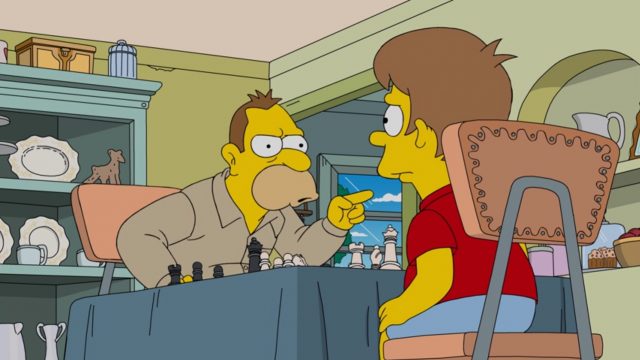
5. It suggests that chess is becoming more popular.
At one point in the episode, Homer and Marge attend the Springfield Chess Club, which has a sign outside that says, "Check for bullies when exiting," evoking the old stereotype of chess being an unpopular and unsocial pass time. When Homer and Marge leave the chess club, someone says, "Nerds! Get 'em!" and the two run away frantically.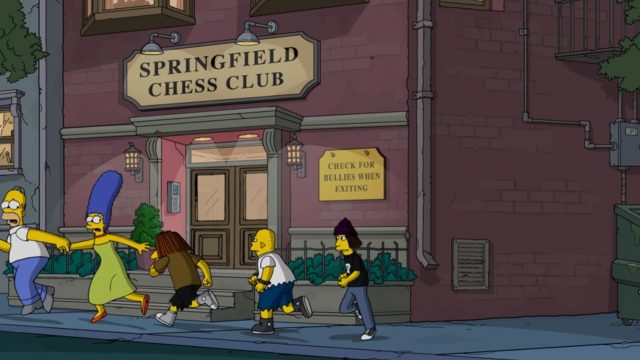
By the end of the episode, however, a crowd of people at Moe's Tavern are enjoying watching Homer's match against his father, demonstrating a newfound popularity for the game. Spectators even take turns cheering for their favored player.
Cons
1. Magnus Carlsen's character is not very Carlsen-esque.
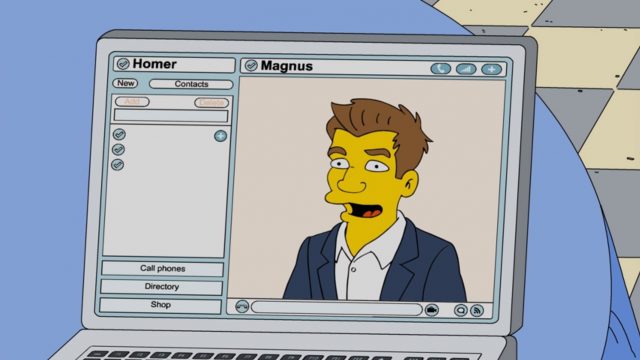 Magnus Carlsen is one of the most interesting personalities in chess. From his chess achievements, including reaching the highest rating in human history, to his modeling career to his dramatic outbursts when he’s having an off day, his character stands out. Yet, The Simpsons didn’t use any of his actual personality when writing his character. Considering that his cameo in The Simpsons has been anticipated for months, this is a disappointment.
If you watch the episode knowing no previous information about Magnus Carlsen, you learn nothing beyond the fact that he is the World Chess Champion and that he’s Norwegian (which is the focal point of nearly every joke in Carlsen’s dialogue).
Carlsen’s cameo gave The Simpsons an opportunity to introduce general audiences to a different side of the chess world and its top players, but it wasn’t utilized.
Magnus Carlsen is one of the most interesting personalities in chess. From his chess achievements, including reaching the highest rating in human history, to his modeling career to his dramatic outbursts when he’s having an off day, his character stands out. Yet, The Simpsons didn’t use any of his actual personality when writing his character. Considering that his cameo in The Simpsons has been anticipated for months, this is a disappointment.
If you watch the episode knowing no previous information about Magnus Carlsen, you learn nothing beyond the fact that he is the World Chess Champion and that he’s Norwegian (which is the focal point of nearly every joke in Carlsen’s dialogue).
Carlsen’s cameo gave The Simpsons an opportunity to introduce general audiences to a different side of the chess world and its top players, but it wasn’t utilized.
2. There are a few errors in the chess content.
- Homer's checkmating move in the first game of the episode leaves his king in check.
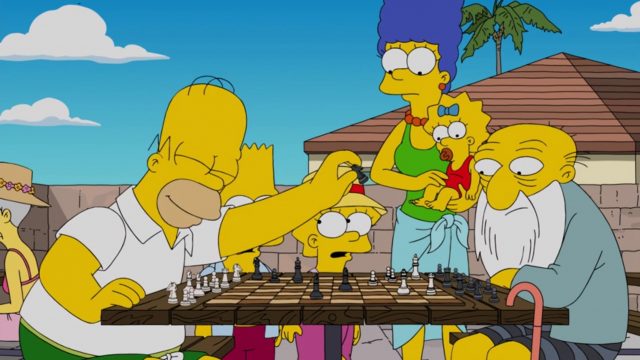 As Homer makes his final move, it looks like White's queen is on c2 attacking Black's king on g6, which would make Homer's checkmate an illegal move.
As Homer makes his final move, it looks like White's queen is on c2 attacking Black's king on g6, which would make Homer's checkmate an illegal move.- One of the game positions in Homer's simul is missing a king.
Position after Homer plays Nxb5:
What's interesting is this position seems to be an attempt at a chess reference gone wrong. If you add Black's king, change one of White's queens into a bishop, and add the dark-squared bishops for each side, we have a position from one of the most famous games in history, Paul Morphy's Opera House Game:[pgn][Event "?"] [Site "?"] [Date "????.??.??"] [Round "?"] [White "Morphy, Paul"] [Black "Duke of Brunswick and Count Isouard"] [Result "*"] [SetUp "1"] [FEN "rn2kb1r/p3qppp/2p2n2/1p2p1B1/2B1P3/1QN5/PPP2PPP/R3K2R w KQkq - 0 10"] [PlyCount "1"]10. Nxb5 $1 *[/pgn]
- Some of the boards are incorrectly oriented.
Conclusion
While the portrayal of chess on The Simpsons wasn't perfect, it shows progress in popular culture's usage of the game. Chess is focal point of the episode, and a definite effort was made to engage serious chess players and fans along with the show's usual audience. Lastly, my favorite joke of the episode: One of the book titles in the chess lesson scenes is titled, Boogie Knights: Chess in the Disco Era.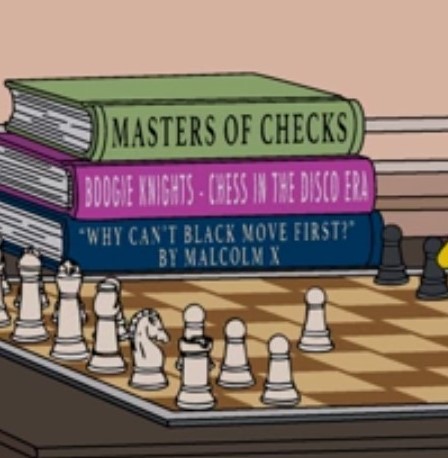 Though, my overall favorite chess scene from The Simpsons is Bart's infamous simultaneous exhibition, featured in a different episode. The scene begins with a Searching for Bobby Fischer "Is this the next prodigy?" aura as spectators watch and discuss the simul:
https://www.youtube.com/watch?v=weAcVf6QUX4
Though, my overall favorite chess scene from The Simpsons is Bart's infamous simultaneous exhibition, featured in a different episode. The scene begins with a Searching for Bobby Fischer "Is this the next prodigy?" aura as spectators watch and discuss the simul:
https://www.youtube.com/watch?v=weAcVf6QUX4
About the Author
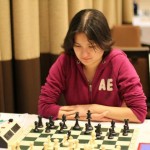 Vanessa West is a regular writer and digital assistant for US Chess News. She won the 2017 Chess Journalist of the Year award.
Follow her on Twitter: @Vanessa__West
Vanessa West is a regular writer and digital assistant for US Chess News. She won the 2017 Chess Journalist of the Year award.
Follow her on Twitter: @Vanessa__West
Categories
Archives
- January 2026 (11)
- December 2025 (27)
- November 2025 (29)
- October 2025 (39)
- September 2025 (27)
- August 2025 (29)
- July 2025 (43)
- June 2025 (25)
- May 2025 (24)
- April 2025 (29)
- March 2025 (29)
- February 2025 (20)
- January 2025 (24)
- December 2024 (34)
- November 2024 (18)
- October 2024 (35)
- September 2024 (23)
- August 2024 (27)
- July 2024 (44)
- June 2024 (27)
- May 2024 (31)
- April 2024 (51)
- March 2024 (34)
- February 2024 (25)
- January 2024 (26)
- December 2023 (29)
- November 2023 (26)
- October 2023 (37)
- September 2023 (27)
- August 2023 (37)
- July 2023 (47)
- June 2023 (33)
- May 2023 (37)
- April 2023 (45)
- March 2023 (37)
- February 2023 (28)
- January 2023 (31)
- December 2022 (23)
- November 2022 (32)
- October 2022 (31)
- September 2022 (19)
- August 2022 (39)
- July 2022 (32)
- June 2022 (35)
- May 2022 (21)
- April 2022 (31)
- March 2022 (33)
- February 2022 (21)
- January 2022 (27)
- December 2021 (36)
- November 2021 (34)
- October 2021 (25)
- September 2021 (25)
- August 2021 (41)
- July 2021 (36)
- June 2021 (29)
- May 2021 (29)
- April 2021 (31)
- March 2021 (33)
- February 2021 (28)
- January 2021 (29)
- December 2020 (38)
- November 2020 (40)
- October 2020 (41)
- September 2020 (35)
- August 2020 (38)
- July 2020 (36)
- June 2020 (46)
- May 2020 (42)
- April 2020 (37)
- March 2020 (60)
- February 2020 (38)
- January 2020 (45)
- December 2019 (34)
- November 2019 (35)
- October 2019 (42)
- September 2019 (45)
- August 2019 (56)
- July 2019 (44)
- June 2019 (35)
- May 2019 (40)
- April 2019 (48)
- March 2019 (61)
- February 2019 (39)
- January 2019 (30)
- December 2018 (29)
- November 2018 (51)
- October 2018 (45)
- September 2018 (29)
- August 2018 (49)
- July 2018 (35)
- June 2018 (31)
- May 2018 (39)
- April 2018 (31)
- March 2018 (26)
- February 2018 (33)
- January 2018 (30)
- December 2017 (26)
- November 2017 (24)
- October 2017 (30)
- September 2017 (30)
- August 2017 (31)
- July 2017 (28)
- June 2017 (32)
- May 2017 (26)
- April 2017 (37)
- March 2017 (28)
- February 2017 (30)
- January 2017 (27)
- December 2016 (29)
- November 2016 (24)
- October 2016 (32)
- September 2016 (31)
- August 2016 (27)
- July 2016 (24)
- June 2016 (26)
- May 2016 (19)
- April 2016 (30)
- March 2016 (36)
- February 2016 (28)
- January 2016 (32)
- December 2015 (26)
- November 2015 (23)
- October 2015 (16)
- September 2015 (28)
- August 2015 (28)
- July 2015 (6)
- June 2015 (1)
- May 2015 (2)
- April 2015 (1)
- February 2015 (3)
- January 2015 (1)
- December 2014 (1)
- July 2010 (1)
- October 1991 (1)
- August 1989 (1)
- January 1988 (1)
- December 1983 (1)


